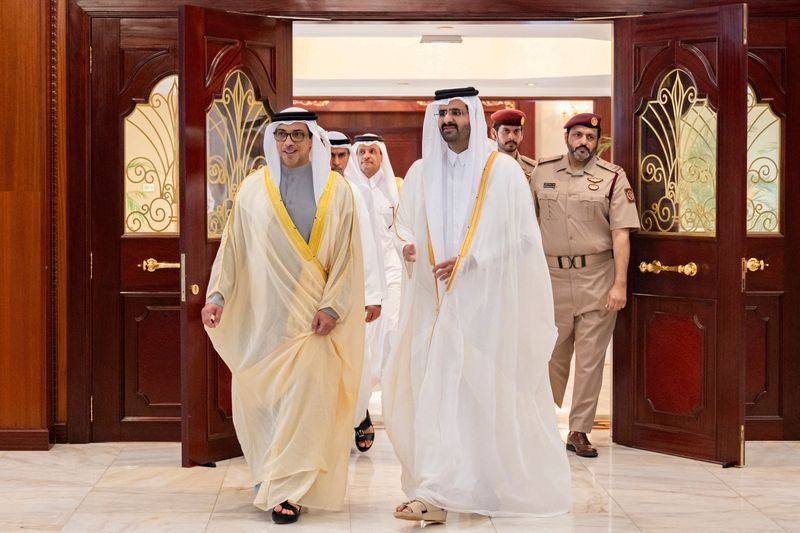
By Maha El Dahan and Pesha Magid
DUBAI (Reuters) – Gulf Arab states sought to reassure Iran of their neutrality in the conflict between Tehran and Israel in meetings in Doha this week on the back of concerns that a wider escalation in violence could threaten their oil facilities, two sources told Reuters.
Ministers from Gulf Arab states and Iran attending a meeting of Asian nations hosted by Qatar centred their conversations around de-escalation, the sources said.
The Islamic Republic launched its largest ever assault on Israel on Tuesday in what it said was retaliation for Israel’s assassination of senior Hamas and Hezbollah leaders and its operations in Gaza and Lebanon.
Tehran said its attack was over, barring further provocation, but Israel has promised to hit back hard.
U.S. news website Axios, citing Israeli officials, reported on Wednesday that Israel could target oil production facilities inside Iran as retaliation.
Urgent de-escalation was at the top of the agenda for all discussions taking place at the moment, one of the sources said.
The Qatari foreign ministry, the Iranian foreign ministry, the UAE foreign ministry, Kuwait’s foreign ministry and the Saudi government communications office did not immediately respond to a request for comment.
Iran has not threatened to attack Gulf oil facilities but it has warned that if “Israel supporters” intervene directly their interests in the region would be targeted.
“The Gulf states think it’s unlikely that Iran will strike their oil facilities, but the Iranians are dropping hints they might from unofficial sources. It’s a tool the Iranians have against the U.S. and the global economy,” Ali Shihabi, a Saudi commentator close to the Royal Court, said.
Top oil exporter Saudi Arabia has had a political rapprochement with Tehran in recent years, which has helped ease regional tensions, but relations remain difficult.
Saudi Arabia has been wary of an Iranian strike on its oil facilities since a 2019 attack on its key refinery at Abqaiq briefly shut down more than 5% of global oil supply. Iran denied involvement.
“The GCC message to the Iranians is, ‘please de-escalate’,” Shihabi said, referring to the Gulf Cooperation Council that is made up of the UAE, Bahrain, Saudi Arabia, Oman, Qatar and Kuwait.

Iranian President Masoud Pezeshkian, speaking at the event in Doha, said Iran would be ready to respond and warned against “silence” in the face of Israel’s “warmongering”.
“Any type of military attack, terrorist act or crossing our red lines will be met with a decisive response by our armed forces,” he said.
This post is originally published on INVESTING.



